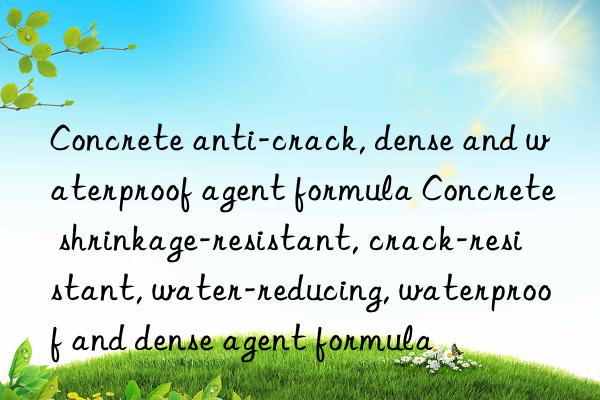
Concrete, as a cheap material, is often used in coal mine tunnel construction projects. Combined with the different geological conditions and construction techniques of tunnel construction, concrete should meet the following characteristics :
(1) The well wall constructed by the common method and the inner well wall constructed by the freezing method are the main structure of the permanent well wall, which serve to seal water and withstand Full water pressure requires the concrete to have small shrinkage and cracking and high permeability resistance;
(2) The well wall concrete is a large-volume concrete, and the hydration temperature rises easily The occurrence of shrinkage cracks, especially temperature difference cracks, coupled with the large burial depth and high water pressure of the aquifer, can easily cause water leakage on the well wall. During construction, in order to prevent flowing, collapse and large water leakage from the frozen well wall caused by the short time of concrete taking out the mold, the above two points require the concrete to have early strength, high density, waterproof, anti-cracking and other properties.
(3) The chemical elements contained in the Quaternary bottom aquifer (referred to as Quaternary) react chemically with concrete materials, often causing the concrete to deteriorate. , or even damage, causing major accidents such as coal mine collapse. Concrete is required to have erosion resistance and high durability.
At present, coal mines have a lot of water seepage and leakage, which seriously affects the quality of the shaft and the coal mining work. There is a lack of dedicated admixture products to solve the above technical difficulties.
The purpose of this technology is to provide a concrete crack-resistant and dense waterproofing agent to improve the impermeability performance of concrete and solve the problem of water seepage and leakage in mines.
The concrete crack-resistant and dense waterproofing agent of this technology is made according to the following method:
Press Add silica fume and expansion agent in sequence and stir for 5 minutes, then add naphthalene-based water reducing agent and fly ash, stir together for 4 minutes, and the preparation is completed.
The concrete crack-resistant and dense waterproofing agent of this technology has the following advantages:
1) This The technology's anti-cracking dense waterproofing agent can react with cement hydration products to form a gel that fills various voids in the concrete, making the slurry denser and significantly improving the compressive strength, flexural strength and abrasion resistance of the concrete.
2) The crack-resistant and dense waterproofing agent of this technology can improve the compactness of cement mortar and concrete, reduce capillary pores, and form microscopic cracks in the remaining capillary pores. The crystal particles form many small interconnected pores, which significantly improves the waterproof and anti-permeability function, and the anti-permeability level can reach above P25.
3) The concrete with crack-resistant and dense waterproofing agent of this technology can greatly reduce the shrinkage rate, reduce the creep of concrete, have the ability to compensate for shrinkage, and greatly reduce the amount of concrete. tiny cracks.
4) The crack-resistant and dense waterproofing agent of this technology contains a low alkali content and will react quickly with the alkali in the cement slurry, thereby effectively preventing Alkali-aggregate reaction.
5) The crack-resistant and dense waterproofing agent of this technology can improve the density of concrete, change the pore structure in concrete, and make the concrete resistant to chlorine salts and sulfuric acid. The performance of salt corrosion can significantly extend the service life of concrete, especially in harsh environments such as chlorine salt, sulfate corrosion, high humidity, etc., which can double to several times the durability of concrete. </p



 微信扫一扫打赏
微信扫一扫打赏
